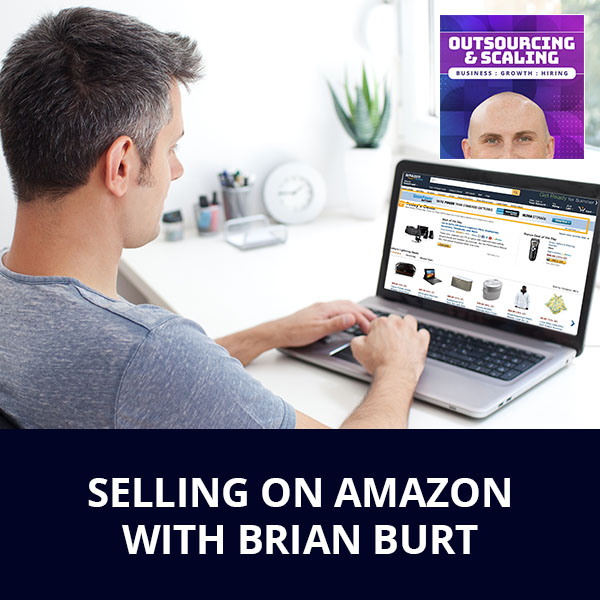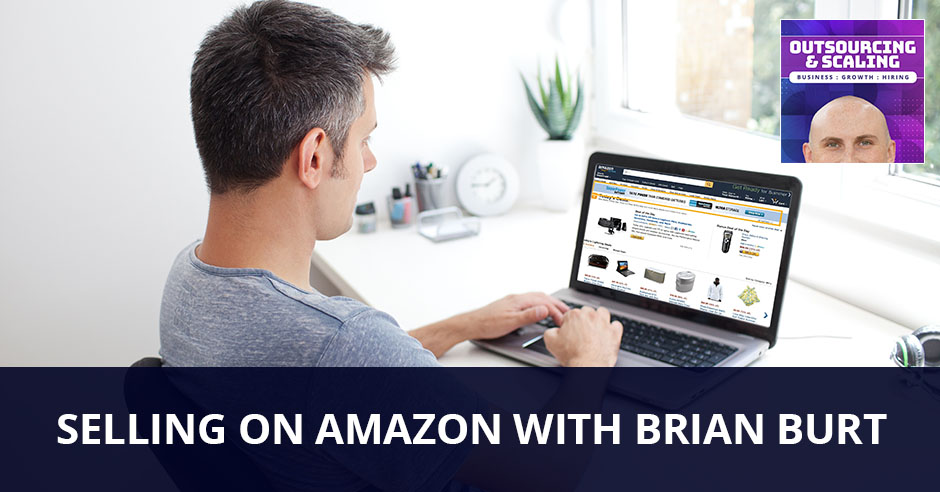


Dubbed as one of the leading digital marketing professionals, Brian Burt is the founding force behind eight multi-million dollar businesses. He is also a five-time 2 Comma Club Award winner, a three-time Amazon Seller Award recipient, and a leading coach and educator for visionary entrepreneurs. Brian tells about his humble beginnings in entrepreneurship from lemonade stands to establishing an auto detailing company, selling auto glass, and getting into SEO and Amazon. He shares one of the major setbacks he has experienced in business and why getting an assistant is the best investment you can make.
—
Listen to the podcast here:
[smart_track_player url=”https://www.podetize.com/statsapi/www.podetize.com/wp-content/uploads/fileuploads/11-5b145ef137b51b3d1af0633e9305c43d/04/2019/f96f81a59cc32a6aa9f5383bbafb8c1c.mp3″ title=”Selling On Amazon with Brian Burt” artist=”Nathan Hirsch” image=”https://freeup.net/wp-content/uploads/2019/04/OAS.png” ]
Download the audio file here.
Selling On Amazon with Brian Burt
We have a very special guest, Brian Burt. Brian, how are you doing?
I’m good, Nathan. Thank you for having me on. This is awesome.
Thanks for coming on. Brian is considered to be one of the leading digital marketing professionals and the founding force behind not one, not two but eight multimillion-dollar businesses. Also, a five-time 2 Comma Club award winner, three-time Amazon Seller Award recipient and a leading coach and educator for visionary entrepreneurs and one of the great nice guys’ in the space. Brian, that’s quite an impressive resume. Take us back. What were you doing before you were an entrepreneur?
There is no answer to that. I’ve always been an entrepreneur. I was the guy that was six years old and grabbing the refrigerator boxes around the block, turning them into lemonade stands and then giving them to friends and taking 50%. I was franchising lemonade stands before I knew what franchising was. I’ve technically never had a job.
You always knew you wanted to be an entrepreneur. Did you go to college?
I did. I went to Arizona State and promptly dropped out of college. I was in marketing classes and business classes. I’m in there sketching. That was pre-iPhone and all that. I’m sketching out business ideas and plans and they were getting shut down by my professors. I said, “I’ve been shut down one too many times. I’m going to go out and start one.” I did. It was off to the races from there.
Everything has its life cycle. You get burnout on a certain business model and want to do something new and fun.
What was people’s reaction when you said, “I’m going to drop out of school and become an entrepreneur?” I know for my side, I started a business while I was in college but dropping out of college was never an option. My parents were both teachers. They probably would have disowned me. Did you get a lot of negative reaction or a lot of support or what?
I could imagine that it would be hard for you. No, I didn’t. I was paying for college myself. I didn’t grow up in anything remotely close to even a middle-class family. I came from a pretty broken home, pretty rough upbringing but nobody likes to hear that stuff. We didn’t have a lot of money. What I did is in high school, I started in auto detailing company. I made enough to put myself through college. Nobody had anything to say. It’s my money, it’s my life and I’m going to do what I want.
You dropped out of college. Do you have this auto detailing company still? What was your first business after that?
That was when I was sixteen and no, I don’t have that. I still love cars and detailing. I’m a car junkie. If anyone knows me, they know I’m a car junkie. After that, I moved into a selling auto glass of all things. I’ve sold well-over $1 million in auto glass but I’ve never installed a windshield myself. I actually became the broker in between auto glass companies and people that needed their windshields replaced. I started a small team in Arizona. I started a small team there of friends and we went door knocking in the middle of the summer in Arizona. It’s 122 degrees and I’m outside walking from door to door for miles every day. We used to get these rags and freeze them the night before and put them around your neck so you could go further every day. Then once we got the windshield contract essentially, we would send that off to a company that we had an arrangement with and they would go out and install the windshield. I was brokering windshields at the time.
It’s funny you said that. I actually did some kind of marketing project where we went to a local business near my college and we work with some auto glass brokers and it’s a very profitable business. You can make a lot of money in that space. I did not know that.
It was way better back in the day the insurance companies are paying us. We were getting upwards of a thousand a windshield and I’d have days where I’d sell 20 or 30 windshields. I’m nineteen years old, bopping around making $20,000 or $30,000 a day. I was living in a high horse there. It was a lot of fun.

How come you stopped doing that or did you keep doing that? What was next?
What happened was Arizona in the middle of the summer sucks. It’s 122 degrees. That was probably 2001 or 2002 somewhere in there. I said, “Let’s see what this whole Google thing is about.” I’m an antique in the industry at this point. I feel like I’m aging myself. I said, “Let’s see what this is about.” I remember I found a guy named Howie Schwartz. He was the only dude out there teaching SEO. I learned a few tricks on the SEO side. At that point, I was about nineteen door knockers is what we call them, working for me. I learned a few tricks on Google and was able to occupy the first three pages of Google. Every listing was mine. It was as simple as posting a Craigslist and building a single link to that craigslist listing and you’d be right on the first page of Google.
I did it over and over. Within three months, I had let everybody go. I kept my assistants that were doing the sales calls for me. Instead of going door-to-door, it all became inbound sales. That was really fun and we had tripled our revenue in that time by getting on Google. I said this is amazing. The funny story is some of the big boys out there weren’t brokers. They were actually auto glass companies and got really mad. They threatened to come out with a lawsuit for monopolization of Google. I’m like, “What is that? Please bring it. I’m not scared.” Sure enough, they realized that it was silly. It was an empty threat. It’s one of those, “If you can’t beat them, join them,” things. They turned to me and said, “Why don’t you sell us the glass?” I negotiated a deal on top of the deal on top of deal and then I was able to expand that business to the entire nation. I secured a contract with the largest auto glass provider in the United States. I was brokering leads to them nonstop and it came good. Eventually, they acquired my portion of the business. Then after that, I moved into teaching that business model, which I later coined the term pay-per-lead. That’s the whole evolution there.
You are going door to door, to getting SEO on Google, to get a threat to join in the competition, to getting bought out from the competition. You said this was about 2002. I got into Amazon about 2008. We’re getting closer and closer. It bridges that gap there. You got bought out. How did you keep going down the digital marketing? Did you start learning about eCommerce?
That’s actually an interesting transition. You probably know as well as I know it’s a lot more common but back in the day, sitting behind your computer all day, clacking away on your computer, making money that way, it’s almost unheard of. I got a little bored. Flash forward, I was doing that for a couple of years. Then I started a group, a Facebook group and it was called PPL Army. That was for other people who wanted to learn how I did what I did because everyone I talked to said, “What are you doing? How are you doing this? It’s like magic. You’re on the first page of Google. How did you do that?”
I started a group and back then I didn’t know webinars were a good platform. If you have a product, you could let your audience know about that product. I was doing it for fun because quite honestly, I was bored. I was in board shorts every day, no shirt and grown a beard. I’m making a lot of money, but I didn’t look like it and I didn’t feel like it. I got a little lonely. I started this group and it was really cool. I still have it. It was training and other entrepreneurs. I’m not even in the group anymore that much. We’ve got other, what we call generals running the group. It was fun for a while. I did almost 300 live, pure value training webinars.
When you’re good at something like marketing online or anything, the doors open up.
At one point, the entire audience came to me and said, “We want a course.” I hadn’t even considered doing a course. I was doing it for fun. I wasn’t charging anybody. I put together a course that was called PPL Empire. I launched that course $2, so it became a $2 course. We’ve sold over 10,000 copies of it. It’s been fun and I’ve spread the word quite a bit about pay-per-lead. It was a good little ride, but everything has its life cycle. You get burnout on a certain business model. You want to do something new and fun. Then down the road, one of my students in PPL Army came to me and he said, “I made $150,000 last month on Amazon.” I said, “What did you do? I hate eCommerce. I don’t want to carry inventory and do all that.” He’s like, “It’s FBA. You don’t have to carry inventory. You give it to Amazon. You ship it from China. I never even see shipping from China to Amazon.” Two months later he had cracked $250,000. This was in 2014. His name was Spencer. I was like, “What are you doing, Spencer?” The student became the teacher a little bit and I said, “Why don’t you train me in this and I’ll train you in pay-per-lead and we can work together?” “I’m good. I don’t need pay-per-lead.” I said, “Let me pay you.” He was nice enough to not accept any cash from me. We work together on it. I got online and it was Amazon ever since.
What was Amazon like back then? I did dropshipping. I was a totally different animal than FBA. I remember back then there was no repricing software. There were no courses or a very few, at least their gurus out there. What was Amazon like that initial few years?
It was a gold rush. I still think there’s a ton of opportunity on Amazon. People are saying, “It’s more competitive.” It is but there are a lot of ways around that. Back then, it was free for all. It was the Wild West. My first product ever, you can laugh if you want to, but it was a selfie stick. You’re doing the whole selfie stick thing. I actually have a giant one right here and that was really good. It was a homerun right out of the gate. I shouldn’t say that. My first month didn’t sell anything. I was running around telling everybody I was going to be an Amazon millionaire. “We’re going to make millions of dollars,” I told my girlfriend at the time. In the first 30 days, it was like crickets. Nothing was happening at all. What I did is I started looking at influencers.
It wasn’t called influencers back in 2013, 2014. It was people that had communities like me. I went to YouTube, I went to Facebook, I went to Twitter and I asked people to help me promote my product. Sure enough, one of my first influencers was a YouTube video. It went massive. It was guys on Segways using my selfie stick to do jousting with each other. They were jousting on Segways with my selfie sticks. It had nothing to do with my product at all. It was a great video. It went viral. Then I’ve got an order from the White House, which was pretty cool. If you’ve ever seen that famous photo of Obama with a selfie stick, that was my selfie stick. Once that hit, it was explosive. We were the number one selling selfie stick for a little while on Amazon. That funded my growth. It funded some other things. Not to say I haven’t had major flops on Amazon. I could always tell you that story too.
Give us a failure. You’ve had a lot of success and it’s been a great ride. I’m sure you’ve had downs like all entrepreneurs do. Is there anything that stands out?
I can tell you about the biggest flop on Amazon and that one was pretty hefty. I moved into electric pet fences. I love pets. I love dogs. I had two at the time. One of them was a wolf. She was a full-on wolf. I’m going to get an electric pet fence. I was looking for it. It’s funny because when you become an Amazon seller, you start seeing every product and you would say, “I could sell this, I could sell that.” I’ve got this hourglass to do productivity timing, if you are familiar with the Pomodoro Technique. It’s a Pomodoro time glass. You look at everything and you’re like, “I’m going to source it all.” I was looking for an electric fence and I said, “I’m going to look into this.” I looked into it. It was a wide-open blue ocean market. I started sourcing it. I got about 500 units to test and about 41 landed cost and I was selling it for $2.29. It was a great margin and I sold out within my first 30 days because there was literally only three or four people selling electric pet fences. A lot of people stayed away from it because there are a lot of electronics in there, there were a lot of moving parts and the liability side. It went very well.

I made a big mistake and seriously learned from this mistake. If you don’t have a really reliable inspection company, get one because I didn’t. I trusted my supplier. I put in a giant 40-foot container order for all pet fences. There were a ton of them. A huge investment because I knew they were going to take off. I could sell whatever I could get. Apparently, my supplier was not large enough to source the raw materials for the pet fence. What happened was these pet fences got to Amazon and they were totally bad. They were electrocuting people’s animals at the wrong time. I guess Fido would be laying on the ground and get zapped. I don’t know about you, but people get really weird when you start electrocuting their pets. We had a huge blowback from that and it was a nightmare. I had all that money. I had to burn the inventory. I couldn’t even liquidate it. Ethically, I love animals. I couldn’t do that to a dog. I had to get rid of it all and it flopped. That put a big pivot in my momentum on Amazon. It took a while to dig myself out of the hole there. That’s my sob story.
You didn’t get recourse for the supplier. Is there anything you can do in that situation and move on?
It was a battle to get back into good graces with Amazon and also to find a new product. We’re at the place now where we’ll source ten products and two of them will do well, 80/20. That’s our plan. We source a lot of them. We test them and we keep the winners and then we scrap the losers. That’s my vetting process.
You’re still a large Amazon seller. What other businesses are you working on at the same time right now?
I launched a course with a friend of mine, Chris Green. If you guys don’t know Chris, check him out. He’s one of the first people in FBA ever. He wrote seven books on FBA. He is the nicest dude in the world. The most giving and caring guy. I said, “You’ve got an audience of 80,000 people. You should put out an educational course. He focuses on Merch by Amazon. It’s doing t-shirts and doing all that. I said, “You’ve got to put out a course. Your audience is begging for it.” It’s like how my audience was begging me back when I was doing pay-per-lead. His audience was begging him. I said, “You’ve got to do it.” I kept telling him and I had no intention of jumping in.
One day, he came to me and said, “I’m ready but I’m not going to do it without you. I’ve seen you do lots and lots of courses. I’ve done probably seven or eight courses myself.” He said, “I’ve seen you do that. You’ve got to help me.” I said, “Let’s do it.” Two weeks later, we flew to California. We were on Hollywood Boulevard with a microphone, interviewing people, asking them what their best t-shirt idea was. Everybody’s had a t-shirt idea. We actually had shirts made that said, “What’s your best t-shirt idea?” We’ve got some characters, people that were like, “I want to put weed plants. The real weed plant on my shirt.” It’s crazy ideas but it made for good entertaining promotional videos.
Play on people’s strengths. When you do that in the right way, through your support and servitude, you’ll get the best out of everybody.
We put together three promo videos and Chris was behind the scenes. He’s like, “I don’t care about the money,” because if you know Chris, he’s not much of a money hungry guy. He goes, “What I do want, I want to be on stage getting a 2 Comma Club Award.” I said, “Let’s work on it. We’ll get to work and we’ll see if we can do this.” We filmed the promo videos we launched. It was successful. We did a lot out of the gate. We called it Merch Dojo. It’s a cool course. If you’re in Merch by Amazon, check that out. Then we were up on stage collecting the 2 Comma Club Award. I was happy to do that for him.
If you don’t know Chris, he a great guy. He’s actually going to be coming on the show. He is the guy when it comes to merch. I don’t think there’s anyone out there that knows more about merge then than he does. You’re running an Amazon business and you’re selling the courses. Are there any other businesses that you’re working on?
I’ve got a few behind the scenes that are getting the bubbles brewing and it’s going well. I consult on a few things as well. It’s been fun. It’s been a good trip. I don’t know what’s coming next but here’s the problem. When you’re good at something like marketing online or anything, the doors open up. Especially when you get in front of a microphone or you get in front of a camera and you’re known a little bit. There are a lot of good opportunities for you to pursue. I didn’t have the wherewithal to say no to anything, mostly because I’m a glutton for everything. Anything I do, I’m obsessed. I got into photography and then bought $25,000 worth of photography equipment that I’ve used once. I get gnarly about it.
The same thing happened here where I said yes to everything and then I had eight businesses. Then I had nine businesses and scale and grew a real business and building a team. I don’t care who you are. If you want to grow past a certain ceiling in your financial career, in your business, you’ve got to have a kick butt team. That’s 100% true. All my teams were me and two assistants my entire life until I doubled down on one and routine of 25 people. That’s what I’m in now in my consulting business. That’s been really my main take away from everything I’ve done.
I’m good friends with Russell Brunson. I’m in his Inner Circle. He took me aside one day and he said, “Brian, you need to kill your babies.” I was like, “First of all, you’re a Mormon. Don’t tell me to kill my children. Second of all, I think you’re right.” Then a few other friends like Alex Hormozi, Alex Charfen and Brandon Poulin, all incredibly successful entrepreneurs that are doing multiple millions every month. In profit, it’s also the same thing. When you hear it from all angles, you listen to it even if you’re stubborn as I am. I said, “I’m going to start killing my babies.” I started chopping off businesses and selling them or shutting them down or giving them to be run by somebody else. That’s the single most important thing I could do because when you realize what it takes to build a $10 million-plus a year business, there’s no way sitting behind a computer as a solopreneur and maybe one assistant that can do it. You need a substantial team to do so many different things.
That’s been my biggest takeaway. Not only that, it’s given me a lot more mental clarity because when you know how to delegate, when you know you’ve got two reliable outsourcers or employee, that’s something that gives you a lot of peace because then you start giving things away. That’s what a real CEO should be doing, not doing the work, not clacking on the computer all day long sending emails. A personal assistant, somebody that’s very good at anything you need we’ll help you exponentially. It’s the best investment you can make. It’s the absolute best investment because if you find somebody good, the return on them is huge because it gives you back your time. Every entrepreneur out there, every CEO out there, you’re the most valuable person in your business and your time is the most valuable thing to you. When you get that back by delegating and building a team, things start to explode.

For those of you that listen to me, that’s what I preach. It’s great hearing it from Brian. How do you manage your time? You showed us the hourglass before. I’m sure you could work 80 to 100 hours a week and still have more to do. How are you prioritizing? Are there any hacks or things that have worked for you that you can share with the audience?
First things first, get yourself an assistant. Don’t worry about getting the absolute needs in your business like a graphic designer, web designer or a funnel maker, Facebook Ads and Amazon, get yourself an assistant. That’s been the biggest thing for me because that assistant then could go out and find the things you need. In doing the interviews, doing the doing, doing the vetting process and trying to find the right people takes a ton of time. It’s something I call a time pig. All these time pigs are out there and you’re out there trying to feed them and groom them and chase him around the yard. By the end of the day, you look up and it’s 7:00, 8:00 and sometimes 11:00 and you go, “Where did my day go?” An assistant can help you do a lot of that.
One of my mentors, Alex Charfen, calls it lowering the pressure and noise. Lower the pressure and noise around you. As a CEO, you get all of these things hitting you. There are questions and emails and Facebook instant messages. It doesn’t stop. If you have somebody to act as a buffer between you and all that noise, things get really clear. Maybe you’ll agree with me, the magic in a good CEO or a business builder is the creativity. It’s having those ideas and seeing the next three steps being the visionary in your own business. When you have that much noise and you’ve got so many people asking you so many things all the time, you get decision fatigue. When you have decision fatigue, then you can’t be creative. Creativity only happens in a quiet, peaceful spot where you feel comfortable and not stressed. An assistant, whether that’s a personal assistant to deal with more personal house stuff or whatever you want or an executive assistant, I’m lucky enough to have both right now. An executive assistant would help you with more the managerial business side of things. Either or will help you start bringing it down. The funny thing is they’re not as expensive as you think. There are a lot of people out there that love to do that.
I completely agree with that. There’s definitely a platform that you can go out and get a great virtual assistant. Tell us what you look for. Tell me what you look for when you hire people. You’ve obviously hired a lot of people. I’m sure you would fire a lot of people. Are there certain qualities that you look for?
It all starts with a DISC Assessment. I don’t know if you are familiar with that. We give that to all of our potential applicants. They go through that and my advice is to start learning how to read a disk. I haven’t read one DISC that doesn’t 100% represent the person I’m talking to. That’s one of the best skills you can have. I’ve gotten good at it myself to where I can almost guess somebody’s DISC and I’m right. Even if you ask the person that takes the DISC and they’re not familiar with the test or even if they are and say, “How accurate do you think this is?” 99.9% of the time they go, “That is me to a tee. I don’t know how they did it but they figured me out.” It’s helpful for people to understand on your team so they have a better understanding of their strengths and for the CEO or anyone in your team because I’m a big fan of playing to people’s strengths. You don’t want to try to improve their weaknesses. You’ve got to play to their strengths. When you do that in the right way, through your support and servitude, you’ll get the best out of everybody.
Let’s say there’s an entrepreneur out there. They’ve scaled their business, they’re in the process and you’ve dropped a lot of great content here. What is another tip? What does one final parting words that you would tell someone who’s trying to scale and maybe they’re struggling a little bit?
A lot of us as entrepreneurs, like Russell said, our businesses are our babies. It’s not your sixth born baby where you let them run face first into a pool. It’s your first born. You don’t want to hand off the kid. “Nobody touches my baby.” You’ve got to let go of that feeling. You’ve got to alleviate that stress. You’ve got to trust people to do what you can do, so delegate. Here’s something I heard and I’ve remembered it, if somebody could do at least 30% of what you can do, that’s a fantastic employee because you could work with that. When you learn the team building skills, when you learn how to grow and scale, you know how to get more than 30% out of that person. If you think they’re awesome and they can do 30%, hire them and delegate. That’s my advice.
Where can people find out more about you?
You can go on to Facebook. I’m at my friend limit. You can find my group if you’re an Amazon seller, which is OverGrowth. If you’re interested in pay-per-lead, you will go to PPL Army. That’s another group on Facebook and I’m in those groups all the time. I’d love to see you there.
Thank you so much for coming on. We appreciate it. We’ll have to have to you back soon.
You’re awesome, Nathan. Thanks so much.
Important Links:
- Brian Burt
- 2 Comma Club
- PPL Empire
- Chris Green
- Merch by Amazon
- Merch Dojo
- Inner Circle
- DISC Assessment
- OverGrowth on Facebook
- PPL Army on Facebook
About Brian Burt

